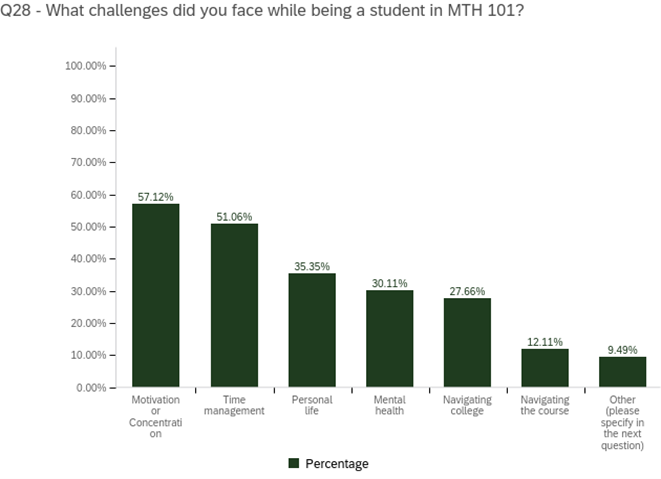Belonging: The hidden variable in math
By Samara Chamoun and Jane Zimmerman
It’s Monday morning, and Antonio wakes up dreading his math class—a class that has quickly become the low point of his week. He has always considered himself “not a math person” and wonders if he will even be able to pass this class, which is a requirement for his degree path. Last week, he’d built up the courage to ask a question only to feel crushed when his professor dismissed him, saying it was something he "should already know" from previous classes. But it’s not just this class weighing on him. Being away from his support system, adjusting to a big university like MSU, and dealing with an isolating math class—it's all too overwhelming.
Alex, on the other hand, is surprisingly excited for her math class this morning! Despite her history of severe math anxiety, she now looks forward to every session at MSU. Her professor has created a welcoming environment where she feels she truly belongs. She can ask questions freely, view mistakes as growth opportunities, and share her thoughts and concerns comfortably.

Our students come to our classes with pre-existing perceptions of their math abilities, often shaped by prior negative experiences and math anxiety. In addition to these factors, numerous challenges can affect their success in the course, ranging from personal issues to mental health struggles and the difficulties of navigating a large university environment. In a recent survey of students in Quantitative Literacy class at MSU, 31% reported struggling with personal problems, while 26% indicated they faced mental health challenges.
Our students need us not only to teach them math content but also to shape the classroom in a way that fosters a sense of belonging—creating an environment where taking a math class does not add another burden to an already overwhelming college experience.
What strategies can we implement to ensure that all students feel a sense of belonging in our math classroom?
In Quantitative literacy (MTH 101), our team has worked on implementing a student success support program aimed at supporting students that may be struggling by offering them tailored help and building meaningful relationships with them. We have tracked submissions, grades, and participation to monitor their weekly progress, and we also sent out surveys with questions that help us identify those who may be facing challenges. Based on our findings, we have undertaken several interventions:
- We have sent personalized outreach emails to those students, offering individual accommodations,
- We have invited students to meet with us weekly to work on study tips, time management strategies, and personalized weekly plans to help them stay on track.
- We have connected students with relevant resources for their situations, including support for mental health, academic assistance, and institutional help.
In College algebra (MTH 103A and B), we have implemented a “Standards-Based” approach to the course structure and grading. This approach fosters a growth mindset by giving students multiple attempts throughout the semester to demonstrate mastery of each of the learning objectives. Because the objectives are very defined and individual mastery scores are displayed for each objective, the student is able to determine for themselves what they understand and what they need more help with. This allows them to take ownership of their learning, developing a sense of efficacy within their math course.
The instructional pedagogy used in College algebra includes multiple opportunities for students to work in small groups. This has encouraged many of the students to develop study groups that meet regularly to practice the concepts covered in class. Forming these friendships with other students helps to develop a sense of belonging. In addition, the discussion that results from the small group projects lifts up misconceptions to be considered. Mistakes are valued as learning opportunities for the entire class, making participation safer and less stressful.
In short, our goal is to meet our students where they are. We want them to understand that math is not an elite subject meant only for “math” people. For many, their lack of math self-efficacy comes from not having opportunities to find an entry point into the concept that makes sense to them and that can be built upon.
Acknowledgments:
Rachael Lund (MTH 101 course supervisor), Sydnie Burnstein, Matthew Emery, Sofia Yacobelli, Lexie Krejcar, Ateeyah Abdul-Wasi, Lydia Bumann, Jordan Green, Carly Hiner, Michael Matuz, Liesl Netherland, Justin Trantham, Jayna Henry, Erin Henthorn, Clara Pater, Jamie Kimble, Erik Flynn, Shikha Bhutani, Andy Krause, Tsveta Sendova, Steven Thomas, Jun Fu, Valentina Maddalena, Keith Promislow, Fast Fellowship 2022-2023 steering committee and cohort.